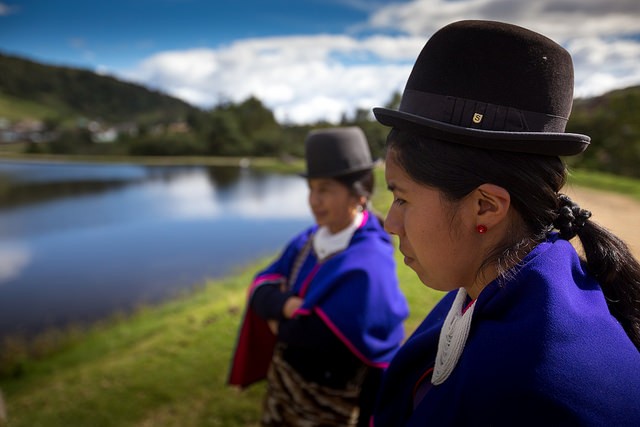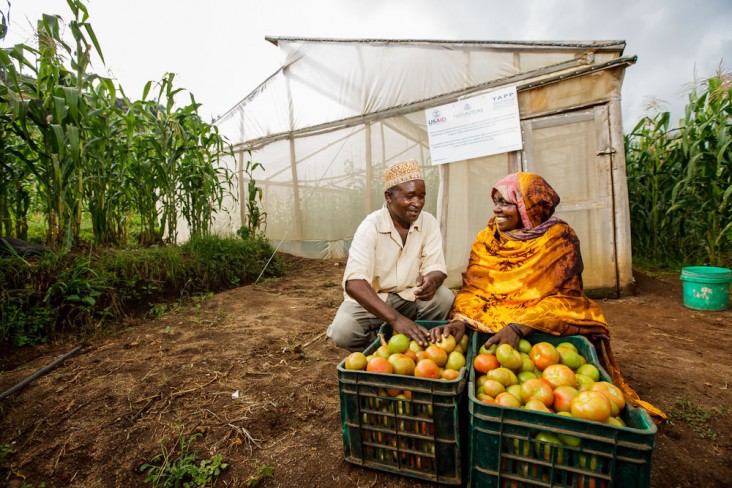- What We Do
- Agriculture and Food Security
- Democracy, Human Rights and Governance
- Economic Growth and Trade
- Education
- Ending Extreme Poverty
- Environment and Global Climate Change
- Gender Equality and Women's Empowerment
- Global Health
- Water and Sanitation
- Working in Crises and Conflict
- U.S. Global Development Lab

Climate change poses both challenges and opportunities for women in the developing world.
As climate change advances and food, fuel and water become more scarce and unreliable, many women will have to work harder and longer to collect them, depriving them of valuable time for education and income-generating activities, and putting them at risk of increased violence and exploitation. Additionally, a lack of legal protections and participation in the formal economy make them more vulnerable. When natural disasters, such as floods and droughts strike, women, especially poor women, can be more vulnerable due to restrictive cultural norms and limited access to trainings and warning systems.
Yet, women play a critical role in helping their communities mitigate and adapt to climate change. Women have invaluable knowledge of community and social norms that can be harnessed to design programs. They often lead the way in adapting to climate change impacts by optimizing energy efficiency, and using low-footprint energy sources and techniques. Studies on women and disaster show that when women are engaged as decision makers in resilience and disaster plans, they are better able to adapt and manage the impacts.
By empowering both men and women, we can address this global imperative faster and more effectively. Through our climate change work, we can help position women as decision-makers in their communities, advocates for conservation and land use rights, and early adopters of renewable energy and climate resilience.

At USAID, we know that addressing climate change and achieving gender equality and women’s empowerment are cornerstones of effective, long-term development. That’s why we’re supporting women through:
- Gender Integration: As mandated by USAID’s 2012 Gender Equality and Women’s Empowerment Policy, [PDF, 2.8MB] all USAID programming must analyze and address gender-related concerns and opportunities in all programming, from the initial stages of project development through the monitoring and evaluation process. This directive guided the integration of gender into USAID’s 2012-2016 Climate Change and Development Strategy. We’re always aiming to mainstream gender more completely.
-
Advancing Research: USAID is leading efforts to increase knowledge around the intersection of gender and climate change. All of the ongoing USAID evaluations of climate change projects take gender into consideration including sex disaggregation of data. Highlights of USAID’s leadership in this area include:
- The 2011 release of the ‘Getting REDD+ Right for Women, [PDF, 1.3MB] which sparked a wave of interest and support from donors and boosted the efforts of NGOs working in this arena.
- The 2013 Gender and Climate Change Adaptation in Agrarian Settings [PDF, 1.8MB] highlighting the importance of taking into account gender and social nuances in climate change vulnerability assessments.
- The ongoing development of a Marginal Populations Annex to the Climate-Resilient Development Framework [PDF, 1.1MB] that will provide guidance on how to work with and engage women and other disadvantaged populations in responding to climate change.
-
Gender Equality for Climate Change Opportunities (GECCO): In September 2013, USAID launched a 5-year grant to the International Union for the Conservation of Nature (IUCN) for the GECCO project, which includes:
- A Gender and REDD+ Learning Exchange, which brought together 52 participants from more than 20 countries. GECCO is producing a series of case studies and has developed a knowledge platform hosted at the REDD Desk with a gender and REDD section.
- The white paper Women at the Forefront of The Clean Energy Future, [PDF, 2MB] which focuses on large-scale or utility-scale renewable energy.
- The development of Climate Change Gender Action Plans (ccGAPs) [PDF, 13.5MB] for Peru and Zambia, informed by IUCN’s expertise and experience from earlier development of 13 regional and national ccGAPs.
- GECCO is also conducting research on gender and Low Emissions Development Strategies (LEDS).
Empowering women benefits everyone by increasing the number of supporters and active participants, and offering diverse perspectives and solutions.
- After a solar-panel technician workshop in Kenya attracted only men, the USAID-funded Vocational Training and Education for Clean Energy (VOCTEC) program sponsored a women-only workshop April 20-29 2015 to ensure women could gain skills needed to advance in the renewable energy field and to train other women. The trainees were so inspired by the course that they formed a local group designed to share skills and encourage other women to work in the renewable energy sector.
- Through its contract with GECCO, USAID is working on Climate Change and Gender Action Plans (ccGAP) in Peru and Zambia. Building off of their successful work in developing 13 regional and country-level ccGAPs, GECCO will be able to help the governments of Zambia and Peru craft overarching plans to ensure that gender is a central element of climate change planning, and help include women in decision making roles.







Comment
Make a general inquiry or suggest an improvement.